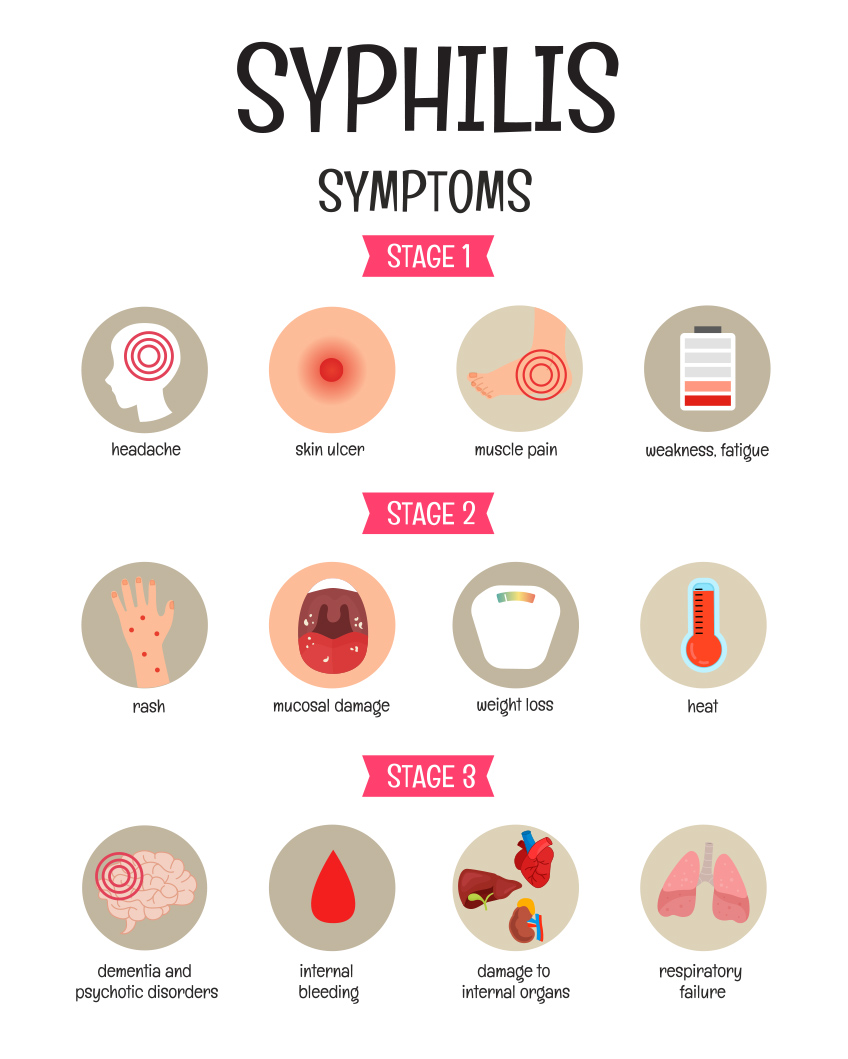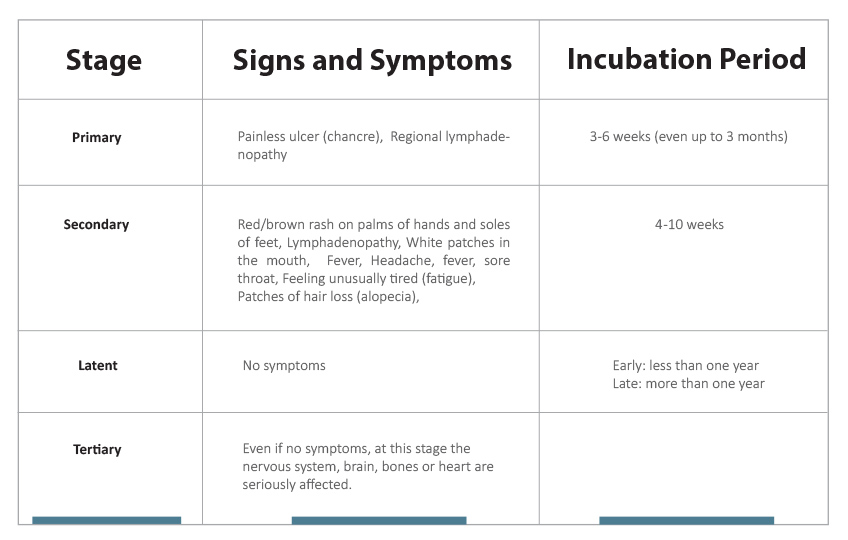Syphilis
What is syphilis?
Syphilis is a sexually transmitted infection caused by a bacterium Treponema pallidum.
Anyone can get syphilis and many people who have syphilis are not aware that they are infected. You can have syphilis and don't notice any symptoms.
Syphilis can be treated and cured. If you do not get treated for syphilis, it can lead to serious health problems.
How does someone get syphilis?
Syphilis can be transmitted through unprotected vaginal, anal and oral sex from an untreated partner or a new partner who is infected. Pregnant persons can pass it to their baby, even if you are not aware that you have been infected. If you had syphilis before, you can still get infected again.
What are the symptoms of syphilis?
Symptoms of syphilis are the same in every person. Syphilis has four stages: primary, secondary, latent and tertiary.
Incubation period is the period between the person being exposed to the organism, in this case a bacterium, and the onset of signs and/or symptoms. Primary Stage
Primary Stage
Signs and Symptoms: Painless ulcer (chancre), regional lymphadenopathy.
Incubation Period: 3-6 weeks (even up to 3 months).
Secondary Stage
Signs and Symptoms: Red/brown rash on palms of hands and soles of feet, lymphadenopathy, white patches in the mouth, fever, headache, sore throat, feeling unusually tired (fatigue), patches of hair loss (alopecia).
Incubation Period: 4-10 weeks.
Latent Stage
Signs and Symptoms: No symptoms.
Incubation Period: Early: less than one year, Late: more than one year.
Tertiary Stage
Signs and Symptoms: Even if no symptoms, at this stage the nervous system, brain, bones or heart are seriously affected.
Can I be tested?
Yes. The doctor can take a swab of the ulcer or a blood test.
Do I need to be tested?
- If you have any of the above signs and/or symptoms.
- If you had or having unprotected vaginal, anal or oral sex.
- Having unprotected sex with more than one partner.
- You have an ulcer which might be caused from syphilis, a swab is needed to detect it. A blood test will be needed too. You are asked to get retested even after diagnosis and treatment to check that you are fully recovered.
What is the treatment for syphilis?
It is important that you receive treatment as soon as possible. The infection can cause serious health problems and complications if remains untreated. Syphilis is treated and cured with antibiotics.
Should I have sex if I have syphilis?
You should avoid sex until both you and your partner(s) have finished the treatment and all the symptoms are gone so you don't infect others or each other again. It is important to follow the advice offered from your doctor.
What are the possible complications of syphilis?
Syphilis stays in your body if left untreated. Without treatment, syphilis can spread into your bloodstream and damage other parts of the body, such as your bones, heart and brain.
Does syphilis affect my risk of getting HIV?
Yes, syphilis increases the risk of getting infected with HIV.
Can I get Syphilis again after I've been treated?
Yes, you can get Syphilis again. You can get it from an untreated sexual partner.
Syphilis and Pregnancy
Every pregnant person in Malta is tested for syphilis. You can still get Syphilis while pregnant if you remain sexually active. If you are pregnant and have Syphilis, you can pass the infection to your baby. Treatment can be given safely during pregnancy.
Untreated Syphilis can lead to serious problems such as miscarriage, still birth or the baby will suffer from serious illness (congenital syphilis).
If you are pregnant and you think that you may have syphilis, see the doctor straight away because you can pass the infection to your unborn child during pregnancy.
Do I need to tell my partner?
It is important to protect and inform your current sexual partner and other previous sexual partner/s that you tested positive for syphilis and that you are receiving treatment. If you have syphilis, it is possible that your sexual partner may have syphilis too. You should also be tested for other STIs.
If someone shares their sexual health status with you be thankful - don't shame them. You and your partner can get tested and treated!
Further information and help
Reference List:
https://iusti.org/wp-content/uploads/2019/11/Syphilis2017.pdf
https://www.bashhguidelines.org/current-guidelines/genital-ulceration/syphilis-2015/